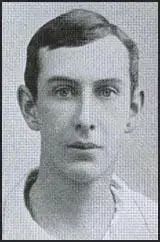Gilbert Oswald Smith (25 November 1872 -6 December 1943), familiarly known as G. O. Smith or simply as G. O. or Jo, was a nineteenth century amateur footballer often referred to as "the first great centre forward". Smith played football for Oxford University before joining the Corinthians. Smith's scoring record for the club - 113 goals in 131 matches - remains one of the best strike rates in the history of the game, equating to one goal for every 104 minutes played. Smith captained the England team on at least 13, and possibly as many as 16, occasions (early records are inexact) between 1896 and 1901. His most productive game in an England shirt came in February 1899, when he netted three times in only five minutes and four times in all during the 13-2 demolition of Ireland. Smith's main problem was that he was slightly built. He was also noted for his reluctance to head the ball, stating that he would be happy to see the practice banned. "G.O." atoned for these deficiencies by positioning himself intelligently and by shooting accurately, and - so his obituary observed - "invariably low", though opponents testified that he was also "hard as a whipcord" and by no means easy to shake off the ball. Ernest Needham was England's captain during Smith's early internationals. He later wrote: "Young players who wish to make a name for themselves as forwards would do well to watch such a player as Mr. G. O. Smith. In him they will see one of the finest centre-forwards England has ever had to represent her in International matches. He is one of the most brilliant and gentlemanly players who ever stepped on to a football field. He has never been known to do anything that was not scrupulously fair, nor to charge foully. He plays the game with ease and gracefulness; he is clever with the ball; he passes accurately; and he is one of the best shots at goal I have ever seen. When he shoots he seldom fails to hit the mark, and he is, above all, unselfish. There you have the ideal forward." Smith’s uncanny instinct for knowing where the ball and his colleagues were led to the saying, “He has eyes all round his shirt”.
Gilbert Oswald Smith

